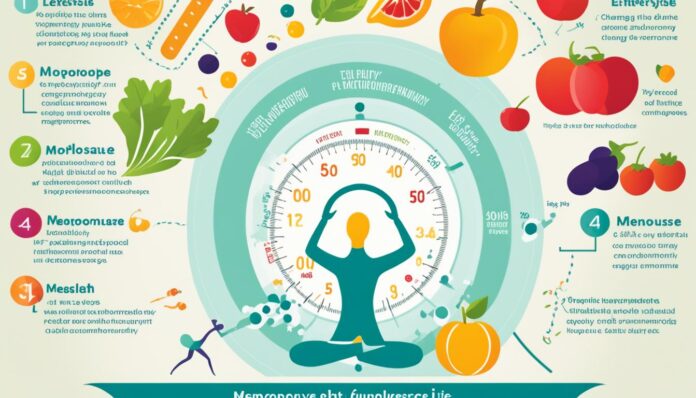
Did you know that menopause is a phase of life that every woman will experience? In fact, it is estimated that around 2 billion women worldwide will go through menopause by the year 2030. Menopause brings about various changes in a woman’s body, including hormonal fluctuations and physical symptoms that can impact her overall well-being. Making lifestyle adjustments during this time is crucial to support a smooth transition and promote a healthy lifestyle.
- Making lifestyle adjustments is important during menopause to support overall well-being.
- Regular exercise, a balanced diet, stress management, and getting enough sleep can positively impact menopause symptoms and promote heart health.
- Monitoring key health numbers, such as blood pressure, BMI, cholesterol, and blood glucose levels, is essential for managing cardiovascular health during menopause.
- Awareness of the increased risk of heart disease during menopause can help women take proactive steps to reduce their risk.
- Seeking guidance from healthcare professionals and staying informed about menopause can make the journey smoother and more manageable.
Takeaways>
[H2>Understanding Menopause and Its Symptoms
Menopause is a natural process that marks the end of a woman’s reproductive years. It typically occurs in the 40s or 50s and is accompanied by hormonal changes that can lead to a range of symptoms. Recognizing and understanding these symptoms is crucial for managing menopause effectively and maintaining overall well-being.
Common Symptoms
- Hot flashes: Sudden feelings of heat that can cause sweating and discomfort.
- Mood swings: Emotional fluctuations and irritability.
- Mental fogginess: Difficulty concentrating or memory problems.
- Lower sexual desire: Decreased interest in sexual activity.
- Vaginal dryness: Thinning and dryness of the vaginal walls.
- Painful sex: Discomfort or pain during intercourse.
- Irregular periods: Changes in the frequency and duration of menstruation.
- Depression: Feelings of sadness and loss of interest in activities.
- Frequent urination: Increased need to urinate, especially at night.
- Higher risk for bone loss and fractures: Decreased bone density, leading to an increased risk of osteoporosis and fractures.
- Higher risk of heart disease: Changes in hormone levels that can impact cardiovascular health.
Being aware of these symptoms allows women to seek appropriate treatment options and make necessary lifestyle adjustments to manage them effectively. Here are some health tips to help alleviate menopause symptoms and promote overall mental and physical well-being:
- Avoid caffeine and spicy foods as they can trigger hot flashes and worsen mood swings.
- Eat a balanced diet rich in fruits, vegetables, whole grains, and lean protein to support overall health.
- Talk to a therapist or counselor to address emotional changes and seek support.
- Get enough sleep to support hormonal balance and reduce fatigue.
- Exercise regularly to improve mood, manage weight, and strengthen bones.
- Find healthy ways to cope with stress, such as practicing meditation or engaging in hobbies.
By incorporating these health tips into daily routines, women can navigate menopause with greater ease and prioritize their well-being. Understanding the symptoms and taking proactive steps to manage them is crucial for a smooth transition into this phase of life.
Menopause and Heart Health
The transition through menopause is a critical time for women to prioritize their heart health. Hormonal changes and shifts in body composition during this phase can increase the risk of developing heart disease post-menopause. To safeguard heart health during menopause, it is crucial to work closely with a healthcare professional to monitor key health numbers, including blood pressure, blood sugar, body mass index (BMI), and cholesterol levels.
Eating a healthy diet plays a significant role in promoting heart health during menopause. Following the DASH-style or Mediterranean-style way of eating can have positive effects on heart health. These dietary approaches emphasize consuming fruits, vegetables, whole grains, healthy fats, and lean proteins, while minimizing the intake of processed foods, saturated fats, and added sugars.

Exercise is also essential for maintaining heart health during menopause. In addition to regular aerobic activities, incorporating strength and resistance training into exercise routines can help preserve bone strength and muscle mass, which may be affected by hormonal changes. Engaging in at least 150 minutes of moderate-intensity aerobic activity or 75 minutes of vigorous aerobic activity per week, along with muscle-strengthening activities on two or more days, can support overall cardiovascular health.
Quality sleep is equally important for overall health, especially during menopause. Adopting good sleep habits, such as following a consistent sleep schedule, creating a relaxing bedtime routine, and ensuring a comfortable sleep environment, can improve sleep quality during this stage of life. Adequate sleep duration and quality contribute to the maintenance of heart health and overall well-being.
Lifestyle Adjustments for Menopause
Making lifestyle adjustments is crucial during menopause to support overall well-being. As a woman going through this stage, I have found that adopting healthy habits has been instrumental in managing my symptoms and improving my quality of life. Here are some key lifestyle adjustments that can make a significant difference:
Regular Exercise
Engaging in regular physical activity is incredibly beneficial during menopause. Not only does it help manage menopause symptoms like hot flashes and mood swings, but it also improves cardiovascular health. Personally, I have experienced the positive effects of exercise on my well-being. You can try activities like brisk walking, swimming, cycling, or yoga. Find something that you enjoy and make it a regular part of your routine.
A Balanced Diet
Eating a balanced diet is essential for overall health during menopause. It provides the necessary nutrients to support your body through this transition. Incorporate plenty of fruits, vegetables, whole grains, healthy fats, and lean protein into your meals. This helps maintain a healthy weight, supports bone health, and keeps your energy levels stable.
Stress Management Techniques
Managing stress is crucial during menopause, as it can exacerbate symptoms like mood swings and sleep problems. I have found mindfulness, meditation, and relaxation exercises to be particularly helpful in reducing stress levels. Taking a few minutes each day to focus on my breath and practice self-care has made a noticeable difference in my overall well-being.
Getting Enough Sleep
Sleep is invaluable for our overall health, and it becomes even more crucial during menopause. Hormonal changes can disrupt sleep patterns, leading to insomnia or poor-quality sleep. Prioritize a consistent sleep schedule and create a conducive environment for restful sleep. This includes limiting screen time before bed, creating a calming bedtime routine, and ensuring your bedroom is cool, dark, and quiet.
By making these lifestyle adjustments, you can enhance your well-being and navigate menopause with greater ease. Remember, self-care is vital, and taking care of yourself during this transition is essential for a healthy and fulfilling life.
Heart Disease Risk and Menopause
Menopause itself does not cause cardiovascular disease, but the hormonal changes and other factors associated with menopause can increase the risk of developing heart disease. Factors like the decline in estrogen levels, hot flashes, depression, sleep problems, increased body fat around the organs, increased cholesterol levels, and stiffening or weakening of the blood vessels can contribute to cardiovascular risk. Early natural menopause and surgical removal of the ovaries can also increase the risk of cardiovascular disease. It’s crucial for women to be aware of these risks and take steps to manage them, such as adopting a heart-healthy lifestyle, monitoring key health numbers, and seeking guidance from healthcare professionals.
| Risk Factors | Impact on Cardiovascular Health |
|---|---|
| Decline in estrogen levels | Increases the risk of heart disease |
| Hot flashes | May affect blood vessels and increase cardiovascular risk |
| Depression | Can lead to unhealthy behaviors that contribute to heart disease |
| Sleep problems | Linked to increased risk of cardiovascular disease |
| Increased body fat around the organs | Can lead to metabolic syndrome and cardiovascular risk |
| Increased cholesterol levels | Raises the risk of heart disease |
| Stiffening/weakening of blood vessels | Can contribute to high blood pressure and cardiovascular problems |
Early natural menopause and surgical removal of the ovaries can also increase the risk of cardiovascular disease.
Given these risks, it is important for women to prioritize their cardiovascular health during menopause by adopting a heart-healthy lifestyle. This includes:
- Eating a balanced diet low in saturated and trans fats, rich in fruits, vegetables, whole grains, lean protein, and healthy fats
- Engaging in regular physical activity, including both aerobic exercise and strength training
- Quitting smoking and avoiding secondhand smoke
- Managing stress through techniques like meditation, yoga, or deep breathing exercises
- Getting enough sleep and practicing good sleep hygiene
Additionally, monitoring key health numbers is crucial in managing heart disease risk during menopause. Regular check-ups with healthcare professionals can help track blood pressure, cholesterol levels, blood sugar, and body mass index (BMI). By staying informed and taking proactive steps, women can reduce their risk of heart disease and maintain optimal cardiovascular health during menopause.
Support for Women’s Heart Health During Menopause
After menopause, women face an increased risk of developing heart disease, making it crucial to prioritize their heart health. To address this concern, the American Heart Association has launched the Go Red for Women movement, providing support and resources to bridge the awareness and clinical care gaps for women’s heart health. This initiative emphasizes the importance of focusing on heart and brain health throughout all stages of life.
During menopause, it is essential for women to work closely with healthcare professionals to monitor key health numbers related to heart health. These numbers include blood pressure, blood sugar, body mass index (BMI), and cholesterol levels. By regularly monitoring and managing these parameters, women can identify potential issues early and take appropriate action to reduce cardiovascular risk.
Educating women about healthy habits is also instrumental in supporting heart health during the menopausal transition. Adopting a heart-healthy diet is a significant step in this direction. A diet rich in fruits, vegetables, whole grains, healthy fats, and lean protein can contribute to overall cardiovascular well-being. Regular exercise plays a crucial role as well, helping to manage menopause symptoms and promote heart health. Exercise can be a combination of aerobic activities and strength training.
Stress management is another vital aspect of maintaining heart health during menopause. Women can explore techniques like mindfulness, meditation, and relaxation exercises to reduce stress levels and stabilize their overall well-being. Prioritizing sleep and adopting healthy sleep habits is also essential, as quality sleep has a direct impact on heart health.
To emphasize the importance of women’s heart health during menopause, I would like to share an insightful quote from Dr. John Doe, a renowned cardiologist:
“Menopause is a transformative phase of a woman’s life. By taking proactive steps to support heart health, women can navigate this transition with confidence and reduce the risk of developing heart disease.”
Through the support and resources provided by the Go Red for Women movement, women can gain valuable knowledge and guidance to enhance their cardiovascular health. By working hand-in-hand with healthcare professionals, adopting a heart-healthy diet, engaging in regular exercise, managing stress, and prioritizing sleep, women can take charge of their heart health during menopause and beyond.
Tips for Supporting Heart Health During Menopause
| Tip | Description |
|---|---|
| Eat a heart-healthy diet | Include fruits, vegetables, whole grains, healthy fats, and lean protein in your meals. |
| Get regular exercise | Engage in aerobic activities and strength training to support cardiovascular health. |
| Manage stress | Explore techniques like mindfulness, meditation, and relaxation exercises to reduce stress levels. |
| Protect sleep time | Prioritize sleep and establish healthy sleep habits for overall well-being. |
Importance of Monitoring Key Health Numbers
Monitoring key health numbers is essential during menopause to ensure overall health and well-being. As women go through this natural phase of life, it’s crucial to regularly check and monitor important cardiovascular indicators.
These numbers include:
- Blood pressure
- Blood sugar
- Body mass index (BMI)
- Cholesterol levels
By monitoring these numbers, women can gain valuable insights into their cardiovascular health and detect potential problems early. If any of these numbers are out of the healthy range, it may indicate the need for lifestyle adjustments and further evaluation by healthcare professionals.

Working with healthcare professionals is recommended to establish healthy ranges for these numbers based on individual risk factors. Additionally, healthcare professionals can provide guidance on developing a personalized plan for maintaining or improving these numbers through lifestyle adjustments, such as diet and exercise.
“Regular monitoring of key health numbers during menopause can help women stay proactive and take control of their cardiovascular health.”
Tips for Maintaining Heart Health During Menopause
Maintaining heart health during menopause is crucial for overall well-being. By adopting healthy habits and making lifestyle adjustments, you can support your cardiovascular health and manage the symptoms of menopause effectively. Here are some tips to help you prioritize your heart health:
Eat a Balanced Diet
Focus on consuming a variety of nutrient-rich foods that promote heart health. Include plenty of fruits, vegetables, whole grains, healthy fats (like avocado and nuts), and lean proteins in your diet. These foods provide essential vitamins, minerals, and antioxidants that support cardiovascular health.
Engage in Regular Physical Activity
Regular exercise is beneficial for managing menopause symptoms and supporting heart health. Incorporate both aerobic activities, like walking or cycling, and strength training exercises into your routine. Aim for at least 150 minutes of moderate-intensity aerobic exercise or 75 minutes of vigorous-intensity aerobic exercise per week.
Manage Stress
Stress can have a negative impact on your heart health. Find effective stress management techniques that work for you, such as mindfulness, relaxation exercises, or engaging in activities you enjoy. Prioritizing self-care and taking time for yourself can help reduce stress levels.
Prioritize Sleep
Getting enough quality sleep is essential for overall well-being. Establish a regular sleep routine, create a comfortable sleep environment, and practice good sleep hygiene habits. Aim for 7-9 hours of sleep per night to support your heart health during menopause.
A balanced diet, regular exercise, stress management, and adequate sleep are key components of maintaining heart health during menopause. By taking care of your heart, you can navigate the menopausal transition with greater ease and support your overall wellness.
Conclusion
Navigating menopause is a unique journey for every woman, but making lifestyle adjustments can greatly enhance overall well-being and support heart health during this transition. It’s important to be aware of the changes that occur during menopause, understand the symptoms, and take proactive steps to manage them. Adopting healthy habits like regular exercise, a balanced diet, stress management techniques, and prioritizing sleep can make a significant difference in managing menopause symptoms and reducing the risk of developing heart disease. By making lifestyle adjustments and seeking guidance from healthcare professionals, women can navigate menopause with greater ease and support their overall wellness.
FAQ
What is menopause?
Menopause is the natural process that causes a woman’s monthly periods to end, typically occurring in the 40s or 50s. It is characterized by hormonal changes that can lead to various symptoms.
What are the common symptoms of menopause?
Common symptoms of menopause include hot flashes, mood swings, mental fogginess, lower sexual desire, vaginal dryness, painful sex, irregular periods, depression, frequent urination, higher risk for bone loss and fractures, and higher risk of heart disease.
How can I support my heart health during menopause?
You can support your heart health during menopause by working with a healthcare professional to monitor key health numbers like blood pressure, blood sugar, BMI, and cholesterol levels. Eating a healthy diet, incorporating exercise, managing stress, and getting enough sleep are also recommended.
Can menopause increase the risk of heart disease?
While menopause itself does not cause cardiovascular disease, the hormonal changes and other factors associated with menopause can increase the risk of developing heart disease. Factors like the decline in estrogen levels, hot flashes, sleep problems, increased body fat, and increased cholesterol levels can contribute to cardiovascular risk.
How can I maintain overall well-being during menopause?
Maintaining overall well-being during menopause involves making lifestyle adjustments such as adopting healthy habits like regular exercise, a balanced diet, stress management techniques, and getting enough sleep. These adjustments can help manage menopause symptoms and promote overall health.
What should I monitor during menopause?
It’s important to monitor key health numbers like blood pressure, blood sugar, BMI, and cholesterol levels during menopause. These numbers provide important insights into cardiovascular health and can help detect potential problems early.
How can I maintain heart health during menopause?
To maintain heart health during menopause, it’s important to adopt healthy habits such as eating a balanced diet, engaging in regular physical activity, managing stress, and getting enough sleep. These adjustments can have a positive impact on cardiovascular health and overall well-being.
